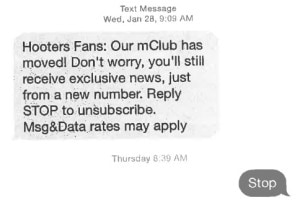August 21, 2017

This month, restaurant chain Hooters of America, LLC (“Hooters”) agreed to pay up to $1,420,150 to settle a Telephone Consumer Protection Act (“TCPA”) lawsuit filed in connection with its text message marketing practices.
How does the TCPA create legal risks for businesses that deliver text messages?
Text Messages and TCPA Lawsuit
Hooters customers can opt into the company’s text message marketing program to receive offers and discounts via SMS. In January 2015, Hooters allegedly delivered a text message to consumers on its marketing list from a new short code:
“Hooters Fans: Our mClub has moved! Don’t worry, you’ll still receive exclusive news, just from a new number. Reply STOP to unsubscribe. Msg&Data rates may apply.”
In April 2015, a Wisconsin resident filed a putative class action TCPA lawsuit against Hooters in the U.S. District Court for the Northern District of Georgia (Case No. 15-cv-1055), alleging that he and numerous other consumers had previously opted out of Hooters’ six-year text message marketing campaign.
TCPA Settlement
On August 9, 2017, plaintiff’s counsel filed an unopposed motion with the Court, announcing the proposed settlement of the TCPA lawsuit with Hooters on a class-wide basis. The proposed settlement separates class members into two tiers: “Tier One” class members (approximately 7,300 individuals) replied to Hooters’ text message with the word “STOP” or a similar opt-out keyword, while “Tier Two” class members (approximately 46,000 individuals) “opted-out of receiving any text message from HOA by not responding.”
Hooters has agreed to distribute $50 and $20 gift cards to Tier One and Tier Two class members who submit claims, respectively, for a total of nearly $1.3 million in gift cards. Hooters has also agreed to pay $10,000 to the named plaintiff, over $110,000 in administrative costs and up to $444,000 of the plaintiff’s attorneys’ fees. In the event that the total amount owed by Hooters exceeds $1,420,150, the Tier Two gift card awards will be decreased in value.
Interestingly, the proposed TCPA lawsuit settlement requires Hooters’ claims administrator, in addition to establishing a settlement website and contacting class members by mail, to provide written notice of the class action settlement by purchasing at least 15 million impressions worth of specified Facebook and Google advertising.
Are Your Text Message Marketing Practices Compliant?
Text messaging (rather than voice or video calling) is now the most widely and frequently used smartphone feature. It should come as no surprise then that more sellers and marketers are capitalizing on the popularity of text messaging to promote their respective products and services to consumers.
However, as the above-referenced case illustrates, text message marketing campaigns are technically classified as telemarketing, and can place sellers and marketers at serious risk of a class action TCPA lawsuit. As such, in order to avoid future legal action and regulatory surprises, sellers and marketers should consult with experienced telemarketing counsel concerning their text message marketing practices and procedures. If you are interested in learning more about this topic, or need to review your text messaging marketing practices, please e-mail us at info@kleinmoynihan.com, or call us at (212) 246-0900.
The material contained herein is provided for informational purposes only and is not legal advice, nor is it a substitute for obtaining legal advice from an attorney. Each situation is unique, and you should not act or rely on any information contained herein without seeking the advice of an experienced attorney.
Attorney Advertising
Related Blog Posts:
DePaul University Loses Spokeo-Based Challenge to TCPA Lawsuit
Twilio Narrowly Avoids TCPA Lawsuit Liability
App Provider Escapes TCPA Liability for User-Initiated Text Message Marketing



